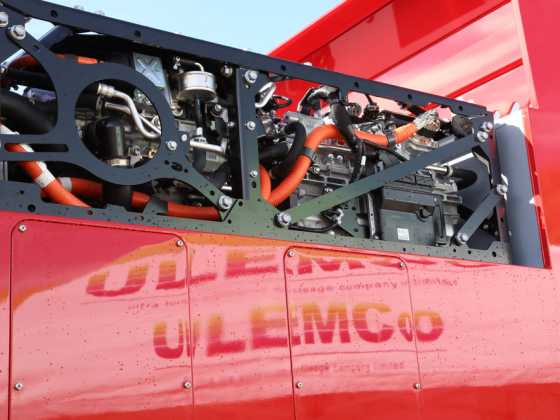Is it a new dawn for electric vehicle skills?

Kevin Finn, executive chair of the Institute of the Motor Industry, gives an update on the challenges the UK and its new government face to ensure skills keep pace with the electric vehicle transition.
The latest data from the Institute of the Motor Industry EV TechSafe data shows that there has been encouraging growth in the number of technicians gaining certification. Over 58,800 technicians are now qualified to work on electric vehicles, representing 24 per cent of the UK automotive workforce. With EVs accounting for 16.6 per cent of new car sales January-June this year, you’d be forgiven for thinking that the sector is on track to provide the right level of support for the EV parc.
However, based on the forecast increase in EVs on UK roads, the Institute of the Motor Industry (IMI) is currently predicting a shortfall of 3,000 EV technicians by 2031, a gap that is expected to reach 16,000 by 2035. Add to this the expected reinstatement of 2030 for the ban on the sale of new petrol and diesel vehicles, it’s not surprising that concerns regarding the EV skills gap remain front of mind for the sector, particularly as vacancies as a whole are stubbornly high - 20,000 at the last count, June 2024.
The regional picture of EV skills is also patchy, creating a potential postcode lottery to find a local technician qualified to work safely on electric vehicles.
While London and the South East have a higher proportion of EVs, the regions do not boast the largest proportion of EV-certified technicians. Just 6.1 per cent and 6.4 per cent of technicians in London and the South East respectively are EV-trained, yet plug-in electric vehicles make up 5.9 per cent of all cars in both regions. The East of England has the highest proportion of EV qualified technicians (9.5 per cent), while Northern Ireland has the lowest (3.7 per cent).
To maintain road safety and meet government goals for net zero, the automotive and fleet sectors need as much help they can get to prioritise the training of technicians to support the growing EV parc.
Although many fleets have their own service and maintenance divisions, those that rely on technicians through franchised dealers or networks of approved independent garages must also have ready access to suitably EV qualified people, as their primary requirement and duty of care is to keep their vehicles properly maintained and on the road.
Applauding Skills England
The good news is that whilst the King’s Speech at the State Opening of Parliament (17 July) made no specific mention of the skills challenges for the automotive sector, the IMI was amongst the first to applaud the announcement of the creation of Skills England.
We were especially pleased to see that collaboration between central and local government and businesses, training providers and unions will be central to this new skills organisation. Tapping into the expertise and experience of businesses and industry specialists will ensure the UK workforce is fit for purpose for next decade and beyond, across all regions and all sectors.
Representing over 100,000 members and all major automotive employers, the IMI is looking forward to providing insight on the particular challenges the automotive sector faces as Skills England evolves.
We will also contribute to plans as the Apprenticeship Levy is replaced with a Growth and Skills Levy. With automotive employers severely under-resourced it is imperative that the pipeline of new talent is adequately filled by new apprenticeships.
Hopefully the new Growth and Skills Levy will give businesses the flexibility they need to spend their levy funds to deliver apprenticeship programmes. And, as importantly, by adapting the way the levy funds can be used, this new approach should also support the creation and delivery of modular training to equip existing staff with future-proofed skills.
Addressing the critical issues
There is a clear opportunity for our new government to learn from the past and provide the support and infrastructure that will ensure the UK remains a global leader in becoming carbon neutral, as well as give businesses and fleet operators the confidence to invest in greener transport solutions.
The IMI has worked hard to engage with all political parties over the last few years to ensure there is a good understanding of what’s needed to keep UK motorists and road users safe. We reaffirmed our beliefs in the run-up to the election with a ‘Wish List’ for the incoming government.
The Wish List addressed each of the critical issues around automotive vacancies, skills, education, and new technologies in automotive and our call to action remains unchanged today.
Alongside the initiatives already proposed on Skills and Apprenticeships, we believe education is important. Infrastructure and pathways are necessary to improve the level of educators/trainers in automotive. The sector is severely under-served currently. It is also critical that automotive is fairly represented in the education curriculum from early years upwards.
What’s more, 2024 is marching on with the skills gap in automotive remaining significant, putting the sector – and road users – at serious risk. And with new technologies including electric and Advanced Driver Assistance Systems (ADAS) emerging at pace, the gap is becoming more pronounced.
Funding for recruitment, training and resources, particularly for the Small and Medium-sized Enterprises (SMEs) that make up such a large proportion of the sector, is crucial. The IMI also hopes industry initiatives that are designed to go to the heart of the skills gap are properly supported by government and employers.
For example, the IMI’s ‘There’s More to Motor’ campaign is helping shift perceptions and encourage more people at all levels to consider a career in automotive. This will vastly increase the talent pool businesses can tap into when recruiting. As the mix of automotive technologies on UK roads demands a more diverse skillset than ever, such initiatives are vital.
The IMI also believes it is vital that the MOT is fit for purpose for a future of ADAS equipped vehicles – as well as for all drive trains.
Future government policies should also take account of the increasing importance of data protection, privacy, and cybersecurity issues in terms of vehicle ownership and usage as connected vehicle data becomes de facto.
Collaboration remains key Most automotive businesses need to train and maintain an omnicompetent workforce – in other words technicians must be able to work on existing petrol and diesel vehicles as well as new electric models, plus be able to deal with vehicles with Advanced Driver Assistance Systems (ADAS). And because the technology does not stand still nor must the skills of the workforce. The role of fleet operators in advancing the UK towards net zero and operating a vehicle parc that is cleaner and better for the environment has, therefore, never been more important.
Now the focus on skills needs to step up. If people and businesses can’t get from A to B because they can’t rely on a competent workforce to maintain and repair the private and commercial vehicles on UK roads, there’s a serious risk to the transportation that underpins the country’s social and economic infrastructure.






